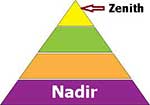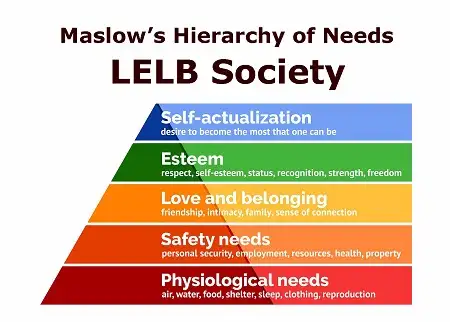Table of Contents
English presentation on Maslow’s hierarchy of needs to practice speaking for IELTS and TOEFL given by LELB Society’s students and members with teacher’s feedback. Join LELB Society to give presentations in English and improve your speaking and pronunciation.
English presentation on Maslow’s Hierarchy of Needs
Reading practice on Maslow’s Hierarchy of Needs

Maslow’s hierarchy of needs is a motivational theory in psychology comprising a five-tier model of human needs, often depicted as hierarchical levels within a pyramid.
From the bottom of the hierarchy upwards, the needs are: physiological (food and clothing), safety (job security), love and belonging needs (friendship), esteem, and self-actualization.
Needs lower down in the hierarchy must be satisfied before individuals can attend to needs higher up.
Source: https://www.simplypsychology.org
Classification of needs

Maslow’s hierarchy of needs is an idea in psychology proposed by American psychologist Abraham Maslow in his 1943 paper “A Theory of Human Motivation” in the journal Psychological Review. Maslow subsequently extended the idea to include his observations of humans’ innate curiosity. His theories parallel many other theories of human developmental psychology, some of which focus on describing the stages of growth in humans. The theory is a classification system intended to reflect the universal needs of society as its base, then proceeding to more acquired emotions. The hierarchy of needs is split between deficiency needs and growth needs, with two key themes involved within the theory being individualism and the prioritization of needs.
Source: https://en.wikipedia.org/
Esteem
Our esteem needs involve the desire to feel good about ourselves. According to Maslow, esteem needs include two components. The first involves feeling self-confidence and feeling good about oneself. The second component involves feeling valued by others; that is, feeling that our achievements and contributions have been recognized by other people. When people’s esteem needs are met, they feel confident and see their contributions and achievements as valuable and important. However, when their esteem needs are not met, they may experience what psychologist Alfred Adler called “feelings of inferiority.”
Source: https://www.thoughtco.com
Self-Actualization Needs

At the very peak of Maslow’s hierarchy are the self-actualization needs. Self-actualizing people are self-aware, concerned with personal growth, less concerned with the opinions of others, and interested in fulfilling their potential.
“What a man can be, he must be,” Maslow explained, referring to the need people have to achieve their full potential as human beings.
Maslow’s said of self-actualization: “It may be loosely described as the full use and exploitation of talents, capabilities, potentialities, etc. Such people seem to be fulfilling themselves and to be doing the best that they are capable of doing. They are people who have developed or are developing to the full stature of which they capable.”
Source: https://www.verywellmind.com/



